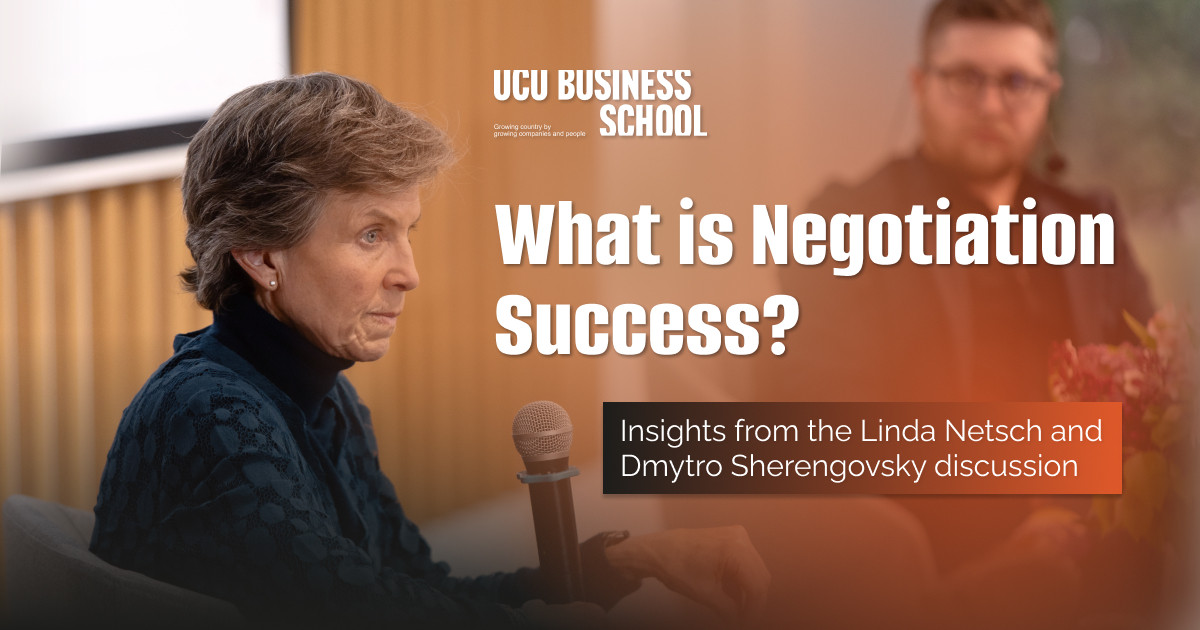At the end of April UCU Business School hosted a discussion with Linda Netsch, founder of Align Consulting and a Lecturer on Law at Harvard Law School, and Dmytro Sherengovsky, Vice-rector for Outreach and Social Engagement UCU, on «Winning the negotiations: what does it mean?». With a background in consulting, she breaks down what it really means to win in a negotiation — it’s not just about getting what you want, but making sure everyone benefits and reaches their goals. Switching from a win-lose to a win-win mindset can affect the outcomes of negotiations.

Take business, for example, Linda emphasizes that even though it is all about the competition, you would rarely have negotiations with your rivals, rather with your potential clients and thus look for ways of making deals and creating value according to the interests of both parties. However, Dmytro points that these rules apply when we have mutual trust and everyone observes the rules, but should we consider different systems of relations and identify where we are?
No matter if we are negotiating for deal making or dispute resolution, we still have rules alongside our own sets of interest, Linda explains. It’s crucial to understand the motivations, fears, and alternatives of the other parties involved — their BATNA (best alternative to a negotiated agreement) — to ensure a successful outcome, which we still can’t predict. Practically we can implement this approach when talking about corruption in Ukraine as a risk for potential investments. Linda emphasizes the importance of transparency and following international norms, as well as studying the interests and risks for our potential investor.
Another tip Linda Netsch shared is to be curious and ask good questions, as well as summarize and paraphrase what has already been said by the other party.
The concept of winning for Linda is: «If I’m stepping back from a negotiation and assessing how well it went, I’ll ask myself a series of questions:
- Did this negotiation improve or at least not damage the relationship?
- Does the deal meet the parties` interest? Did we create value in the deal?
- Is the deal better than our best alternative (BATNA)?
- Is it based on clear communication?
- Is it based on norms, legitimacy, fairness?
- Do we have a clear commitment and do we know how to implement it?»
Furthermore, in Dmytro’s view, to win means to be prepared and come with some assumptions of the possible outcomes, understanding your own BATNA as well as the other side’s BATNA. To do so, Linda suggests to think of the resources, skills and connections all parties involved have, and what they can bring to the table.
Moving to the Q&A session, we gathered that negotiations are about not only convincing the other party, but also understanding them, so it’s about a balance between talking and getting feedback, persuading and listening.
Another big question concerns negotiating with someone, who has more power, or someone, who’s «playing dirty», to which Linda answers that you should try and make the alternative of the stronger party not so appealing and strive to satisfy their interests. Moreover, oftentimes the behind the scenes negotiations are the ones actually working. In addition, Dmytro suggested that sometimes switching from bilateral negotiations to multilateral, involving the third party, studying the context might have a positive impact and even dramatically change the deal.
Next question concerns when and how to leave the negotiations if they are not meeting your interests. The advice Linda provides is to be clear, as much as it is culturally appropriate. You can always leave the door open to possible future negotiations if you think it might benefit you.
Another question deals with setting the zone of your possible agreement and if it is worth it to lower your expectations for one negotiation if it can bring more result in the long run. Here, the solution according to Linda is that the first offer has to be as favorable for you as you can justify, the reputation and ongoing trust are crucial, and, Dmytro adds, game theory, especially the prisoner’s dilemma, can help you in such situations.
Among some other takeaways from Linda’s experience is that the more people you have in a negotiation, the messier it can get, thus, consider having mediators — someone that can be trusted by both sides.
If you’re desperate to win the deal, but your counterpart might find more attractive options, you should figure out your value and try to win the support of the other side by explaining how you are better than others, not just purely financially.
You need to balance empathy (which is not sympathy) and assertiveness, but both are important to develop to be able to protect your interests.
To the question on what do we do if the conditions change and the new party enters the negotiations, Linda provides an example of how Ukrainians felt more optimistic last April since the BATNA at that time was more positive, whereas this April, especially before we knew we were getting the support from the USA, our BATNA was different, so overall it is dangerous to be static, you need to constantly assess all the changes in the context.
Sometimes you need the leap of faith, however, you should always protect yourself from the worst-case scenario.
To the final question on what her interest in being here and supporting Ukraine is, Linda answers:
«My interest in Ukraine is just what’s right. I think I’m inspired by Ukrainians. I had been to Kyiv many many years before, I was surprised at that time how beautiful that place was, the place I knew nothing about, most Americans don’t. And I remember being very positively influenced from my years ago visit to Kyiv, I just like this place. And then, when I was invited to come teach here, there wasn’t even a hesitation in my mind. I mean, I do have a job, I’m on vacation right now. I think this is important, I can’t persuade everybody in Congress, can’t get you an F-16, but if what I do for a living can be helpful, than that’s my contribution. I consider it to be a privilege to be here, as it is an existential crisis not just for you, but for democracy, for the rule of law and international norms, and the fact that Ukraine, with the size of your country and the ability to hold off this aggression in the name of democracy and the rule of law and international norms, and just human decency, I want to contribute to that in any little way that I can».






















